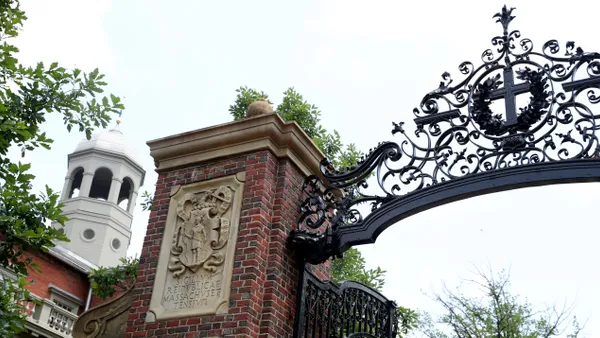Dive Brief:
- The number of students who graduated at the end of the 2021-2022 academic year with a degree in accounting plunged 7.4% compared with the prior period, accelerating a six-year trend of declining entrants into the profession.
- The number of graduates who received a bachelor’s degree fell 7.8% compared with the 2020-2021 period, while those earning a master’s degree declined 6.4%, according to a survey by the American Institute of Certified Public Accountants. At the conclusion of the 2020-2021 academic year, the number of bachelor’s and master’s degrees awarded fell 2.8% and 4.7%, respectively, compared with the prior period.
- “We’re still on a downward trajectory for accounting graduates, although it’s worthwhile to note that U.S. university enrollment and earned degrees collectively shrank during this period,” Jan Taylor, the AICPA’s academic in residence, said in a statement.
Dive Insight:
Underscoring a shortage of accountants, fewer than 1% of small- and medium-size CPA firms can find enough qualified U.S. candidates for employment, according to a recent survey of 250 top CPA firm executives by alliantTALENT.
About 1.65 million accountants and auditors were employed in the U.S. last year, 15.9% fewer than in 2019, according to Bureau of Labor Statistics data. More than 300,000 accountants quit their jobs between 2019 and 2021.
In an effort to fill openings, CPA firms are hiring workers overseas, shifting basic tasks to technology, allowing accountants to work from home full time and signing on accounting students before college graduation, according to the alliantTALENT survey results.
Accountants and financial executives point to a range of reasons for the profession’s fading appeal among students.
Would-be accountants turn to other lines of work rather than meet the requirement of 150 college credit hours for obtaining a certified public accounting license, the accountants said.
“Relative to technology, consulting and investment banking, CPA designation requires an additional year of school without an identified financial benefit,” LeaseQuery CFO Justin Smith said.
“Accountants are just as analytical and capable as peers on similarly competitive paths, but there may be a perception that the path is more limited from an exit perspective with a slower progression, especially for those who go corporate early on,” he said in an email response to questions.
Trimming the 150 required credit hours would “mean lower tuition and related costs, making the profession more accessible to a wider range of candidates,” Smith said.
Accounting standard-setters should also allow students to gain certification through apprenticeships as well as through formal academic programs, according to Caitlynn Eldridge at Eldridge CPA LLC.
“No one walks out of college capable of running an audit, preparing SEC-level financial statements, or preparing complex tax returns — the education is not as beneficial as on-the-job training,” she said in an email response to questions.
Accounting firms and educators could make the profession more appealing to students by emphasizing the use of the new technology in routine tasks, according to Martin Mulyadi, an accounting professor at Shenandoah University. Such efforts would transform AI from a perceived threat to job stability into a source of job satisfaction.
“By automating mundane and repetitive duties, artificial intelligence enables accountants to focus on more analytical and value-added tasks,” Mulyadi said. AI “appeals to a newer generation that has grown up in a tech-savvy environment and is eager to utilize technology and innovation in their careers.”
Comparatively low starting pay also discourages many students from choosing the field, the accounting and financial executives said.
As of May 2022, the median annual wage for accountants and auditors was $78,000, according to the BLS.
Within five years of graduation, career “paths in technology, consulting and investment banking can provide candidates with the opportunity to consistently earn $200,000 to $300,000 annually or more, with upward progression,” Smith said.
Still, to a student considering accounting as a profession “money is important, but it isn’t everything,” he said, noting that since the pandemic LeaseQuery has switched to a hybrid work schedule.
“The perception of long hours and high stress in certain accounting roles may deter candidates who prioritize a healthy work/life balance,” Smith said.
Nicholas Valentini, CFO at Sax LLP, said that prospective accountants look for more than just a solid salary.
“I do not believe that a salary increase alone can reverse the trend” in the falling number of graduates with accounting degrees, he said in an email response to questions. “Employees want to enjoy what they do, have work/life balance, be part of a team and feel like they are making a difference.”














